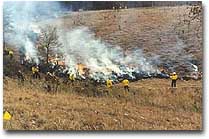Recommendations for Land Acquisition
The Wildlife and Heritage Service regularly reviews its database to determine areas it considers priorities for acquisition to maintain the quality of the unusual ecosystems, natural communities, or habitats for rare species. These recommendations are used by Maryland Department of Natural Resources, The Nature Conservancy, and other conservation organizations interested in purchasing ecologically significant properties. The Department of Natural Resources receives dedicated funding, through a very small percentage of the real estate transfer tax, called the Heritage Conservation Fund to be used specifically for the purchase of important natural areas harboring habitats for rare species or unique natural communities.
Recommendations for Conservation Easements
In addition to the outright purchase of properties considered significant for protecting Maryland's biodiversity, conservation easements are another powerful protection tool. Through this method, the landowner still owns the property, but the rights to develop certain areas are sold or transferred to a conservation organization for a specific amount of time. The Wildlife and Heritage Service provides recommendations to the Maryland Environmental Trust and to local land trusts regarding the ecological significance of properties under consideration for easement purchases. If an easement is pursued, staff biologists work with the landowners and representatives of the trusts to develop and include in the easement appropriate language to safeguard the unique communities or habitats present.
 Natural Community Restoration Projects
Natural Community Restoration Projects
Many natural areas require active management in order to maintain or enhance the natural communities or habitats of rare species that are present. Some of the state's rare species require early successional habitats which can become quickly overgrown if natural disturbance processes, such as fire or flooding, are suppressed or eliminated. In many areas throughout the state, the widespread growth of invasive exotic species threatens to crowd out both rare and common native flora and fauna.
Our largest restoration project is ongoing at Soldiers Delight Natural Environment Area in Baltimore County. More than 1,000 acres of native serpentine grassland and oak savannah habitat have been altered over the last 50 years by the encroachment of Virginia Pine. The numerous rare and endangered species present are losing the specialized habitats that evolved at this serpentine outcrop over thousands of years. By removing the invading pines and restoring the disturbance regime through prescribed burns, this area is currently being restored.
The purpose of the Maryland Department of Natural Resources’ Pollinator Habitat Plan is to:
- Examine the role pollinators play in natural landscapes;
- Outline a strategy for the long term conservation of pollinators;
- Develop guidelines for the conservation of pollinator habitat; and
- Compile best management practices for the designation of Pollinator Habitat Areas